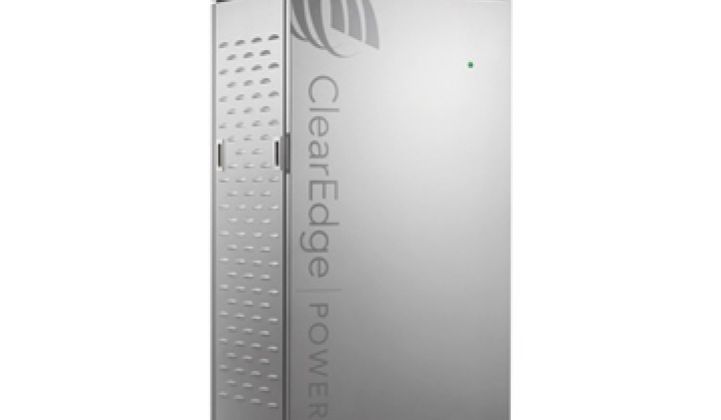David Wright is the relatively new CEO at privately held fuel cell vendor ClearEdge Power. He doesn't strike this reporter as a science nerd, despite his bachelor's degree in physics, and he doesn't seem overly obsessed with fuel cell stack chemistry.
Wright does seem concerned with helping businesses make money, however. He was previously CEO and chairman of GridIron Systems, and CEO of Verari Systems before that. He was CEO of Legato Systems before EMC acquired the company in 2004. Prior to Legato, Wright was president and CEO of Amdahl.
Wright now exposes his CEO legacy to the lure of fuel cells.
Here's a refresher on ClearEdge: The Hillsboro, Oregon-based company raised more than $136 million in VC funding since its founding in 2006 from Kohlberg Ventures, Applied Ventures (the investment arm of Applied Materials), Big Basin Partners, and Southern California Gas Company to develop and build a proton exchange membrane-based fuel cell for residential and small commercial applications. ClearEdge's core product was a modular PEM fuel cell going after combined heat and power (CHP) applications at hotels, multi-tenant buildings and schools, with power ranging from 5 to 200 kilowatts. The fuel cell can export excess heat for hot water, forced hot air, or hot-water cleaning.
In December 2012, ClearEdge acquired the fuel cell business of technology conglomerate United Technology Corporation (UTC). UTC Power was a maker of large-scale phosphoric acid fuel cells (PAFCs), although the firm also has experience with PEM, alkaline, solid oxide, and molten carbonate fuel cells. CEO Wright estimates that UTC invested roughly $1 billion in the technology over the last 30 to 40 years.
Along with the new CEO, ClearEdge also switched out its core PEM product to the phosphoric acid technology for its 5-kilowatt and 400-kilowatt products. The natural gas-powered UTC 400-kilowatt fuel cell unit has a reputation in the industry as one of the higher-performing products.
We spoke with Wright at a crowded Cleantech Forum in San Francisco. The CEO chided the fuel cell industry for serving as a "technology playground," rather than focusing on solving customer problems or offering business solutions.
As an example, Wright suggested that in selling a power solution in an $80 million deal with Verizon, the negotiation on price was secondary to the negotiation on installation details.
Wright sees recent weather and terrorist events as having increased the awareness and value of business continuance and critical power. He suggested that uninterrupted power "has almost become a Sarbanes-Oxley" issue of necessary compliance, saying, "You're out of power, you're out business."
Wright pointed out that ClearEdge provides "primary power as well as backup power. We run parallel with the grid." He also said that the firm had scraped 32 percent of the cost out of the systems and will again reduce the cost significantly in 2014.
He stressed the importance of service and maintenance. The UTC (now ClearEdge) fuel cell provides a ten-year stack life, which is well above the three- to five-year stack life of other manufacturers, according to the CEO. Wright claims that "Bloom [Energy] has a three-year stack [life]." As GTM has reported, an extended warranty for a two-Bloombox-unit, 400-kilowatt plant would cost about $425,000 per year. That's 13.3 cents per kilowatt-hour just for warranty costs.
The CEO claims that the ClearEdge fuel cell fleet has an uptime of 98 percent, up from 94 percent last year, and the goal is to limit service calls to three per year.
On the business side, Wright said that cost is now low enough and the technology sufficiently optimized to allow him to "write a ten-year contract and make money on it." The CEO said that the firm would be gross-margin-positive in the third quarter and cash-flow-break-even in the last quarter of the year. Wright wants the fuel cell to be economically viable without subsidies by 2016.
And importantly, notes the CEO, the company has gotten "five or six banks," including Macquarie, to provide a $400 million line of credit "to finance this stuff."
As mentioned, Wright is a long-time CEO, who has succeeded, in his words, "by selling at the right price, building at the right cost and servicing at the right cost." If he can make that happen for ClearEdge, it will be a first for the fuel cell industry.



